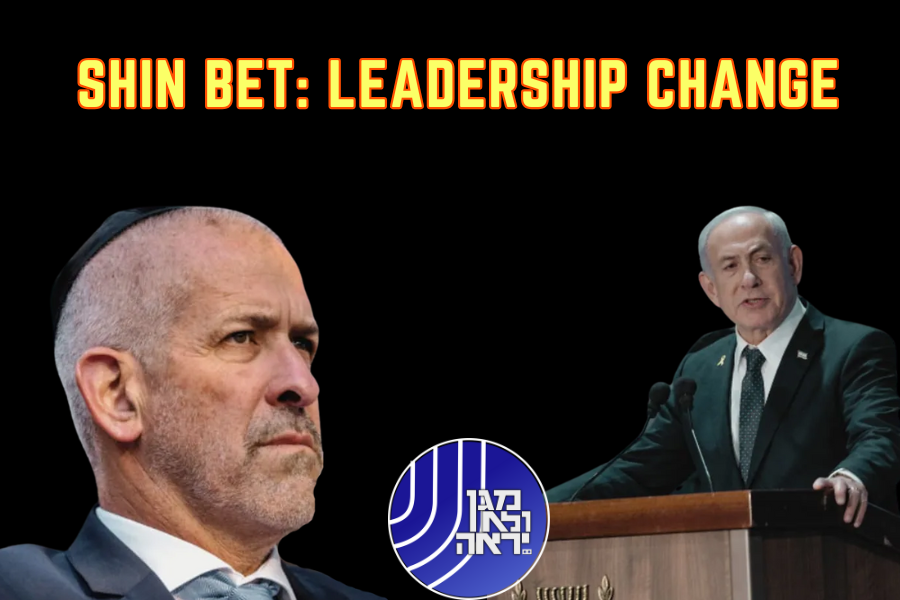(By Khalid Masood)
As Israel wages a perilous war against Iran in June 2025, its internal security apparatus, the Shin Bet (Israel Security Agency, ISA), stands at a pivotal juncture. The abrupt departure of director Ronen Bar, amid allegations of politicization, and the appointment of Major General David Zini as his successor, signal a seismic shift in Israel’s intelligence community. The Shin Bet’s role in countering internal threats, its rivalry with Mossad, and its transformation under war’s pressure offer critical insights into Israel’s resilience and vulnerabilities. This article dissects the Shin Bet’s mandate, achievements, and operational framework, contrasts it with Mossad, and forecasts its evolution under Zini’s command, set against the backdrop of a nation under siege.
Israel’s Intelligence Triad: Shin Bet, Mossad, and Aman
Israel’s intelligence community, a formidable triad of Shin Bet, Mossad, and Aman (Military Intelligence Directorate), is a cornerstone of its national security, honed by decades of existential threats. Shin Bet, known as Shabak, is Israel’s internal security service, akin to the FBI or MI5, tasked with counterterrorism, counterintelligence, and protecting state institutions. Its motto, “Magen v’lo Yera’eh” (“the unseen shield”), reflects its covert role in thwarting domestic threats, from Palestinian terrorism to Jewish extremism. Mossad, the foreign intelligence agency, operates globally, focusing on intelligence collection, covert operations, and counterterrorism against external enemies, such as Iran’s nuclear program. Aman, embedded within the Israel Defence Forces (IDF), provides military intelligence, assessing war risks and supporting battlefield operations through units like 8200 (signals intelligence).
The division of labor is geographical and functional: Shin Bet guards the homeland, Mossad strikes abroad, and Aman bridges military and strategic intelligence. Shin Bet’s jurisdiction includes Israel, the West Bank, and Gaza, targeting Palestinian militants and, increasingly, Jewish settlers involved in terrorism. Mossad’s operations span Tehran to Turkey, executing assassinations and espionage, often with a flair for audacity. Unlike Mossad’s independence under the prime minister, Aman operates under the IDF’s chain of command, though all three report to the premier. Tensions arise over jurisdictional overlaps, as seen in the 1990s when Aman’s political intelligence role sparked reform debates. The “Magna Carta,” an ongoing agreement among agency heads, seeks to resolve these disputes, but rivalries persist, fueling efficiency and occasional failures, like the October 7, 2023, Hamas attack.
Shin Bet vs. Mossad: A Study in Contrast
Shin Bet and Mossad, though siblings in Israel’s intelligence family, differ starkly in scope and style. Shin Bet’s inward focus demands granular human intelligence (HUMINT) within Israel’s volatile territories, interrogating suspects and monitoring communities, often controversially. Its three wings—Arab Affairs, Non-Arab Affairs (countering espionage and Jewish extremism), and Protective Security (guarding leaders and infrastructure)—reflect a domestic mandate. Mossad, with its eight departments, including Collections (espionage) and Metzada (assassinations), thrives on global reach, leveraging psychological warfare (LAP) and high-tech sabotage. Shin Bet’s operations are reactive, neutralizing imminent threats; Mossad’s are proactive, shaping geopolitics, as in its 2018 theft of Iran’s nuclear archive.
Operationally, Shin Bet collaborates closely with the IDF, providing real-time intelligence for arrests or airstrikes in Gaza, while Mossad partners with foreign agencies like the CIA, as seen in joint operations against Hezbollah. Shin Bet’s failures, like Yitzhak Rabin’s 1985 assassination, draw domestic scrutiny; Mossad’s missteps, such as the 2010 Dubai assassination using forged passports, spark international outcry. Budgetarily, Shin Bet’s resources are modest compared to Mossad’s estimated ₪10 billion ($2.73 billion), reflecting their respective scales. Yet, Shin Bet’s cyber capabilities, rivaling Mossad’s, underscore its growing technological edge, a necessity in countering digital subversion.
Shin Bet’s Achievements: A Legacy of Vigilance
Since its 1948 founding under Isser Harel, Shin Bet has notched remarkable successes, often at great cost. Its 1967 Six-Day War triumph, where double agent Ri’fat al-Gamal fed Egypt false intelligence, enabled Israel’s preemptive strike, crippling Cairo’s air force. In 1961, Shin Bet unmasked Soviet spy Israel Beer, a senior military commentator close to Ben-Gurion, averting catastrophic leaks. During the Second Intifada (2000-2005), Shin Bet’s intelligence led to targeted killings of Palestinian militants, curbing suicide bombings. In 2019, it thwarted over 450 terror attacks, including Hamas plots, using cybertech to infiltrate networks. The 2023 rescue of soldier Ori Magidish from Gaza, amidst the October 7 fallout, restored some agency pride, showcasing its precision under pressure.
Yet, Shin Bet’s record is marred by controversies. The 1984 Bus 300 affair, where agents executed captured Palestinian hijackers, exposed brutal tactics, leading to the Landau Commission’s sanctioning of “moderate physical pressure.” Its surveillance of Palestinian citizens and torture allegations, condemned by the UN, draw parallels to Pakistan’s own counterterrorism dilemmas, where security imperatives clash with human rights. Shin Bet’s role in foiling Jewish terrorism, as in 2024’s West Bank settler attacks, highlights its evolving focus, a shift from its early Soviet-centric counterespionage days. These achievements, though, came under strain in 2023, when Shin Bet’s failure to predict Hamas’s assault shook public trust, a wound reopened by the 2025 Iran war.
Shin Bet’s Operational Mechanics and Responsibilities
Shin Bet operates as a clandestine shield, its 5,000-strong workforce spread across Tel Aviv’s headquarters and regional offices. Its three wings execute distinct roles: Arab Affairs counters Palestinian terrorism, Non-Arab Affairs tackles espionage and Jewish extremism, and Protective Security safeguards leaders, embassies, and El Al flights. Advanced cyber units, leveraging AI for data mining and speech recognition, collect vast metadata, infiltrating networks to preempt attacks. Unlike Israel’s police, Shin Bet can detain suspects without legal counsel for up to 20 days, a power criticized as draconian but defended as vital. It answers directly to the prime minister, with Knesset oversight via the Subcommittee for Intelligence and Secret Services, ensuring budgetary and operational accountability.
In practice, Shin Bet blends HUMINT, SIGINT, and cyber operations. Case officers recruit informants in the West Bank, analysts parse intercepted communications, and operatives join IDF raids to capture militants, as in June 2025’s Menashe arrests. Its cyber division, expanded under Nadav Argaman (2016-2021), rivals Mossad’s, targeting Hamas’s digital infrastructure. Shin Bet’s “mamlachti” principle—non-partisan civic duty—shields it from political misuse, though 2025 allegations of Netanyahu’s interference challenge this ethos. From Pakistan’s perspective, Shin Bet’s integration with the IDF mirrors the ISI’s synergy with the military, but its legal autonomy raises questions about unchecked power, a concern echoed in Islamabad’s debates over intelligence oversight.
Leadership Change: From Ronen Bar to David Zini via Interim Deputy “S”
On June 15, 2025, Ronen Bar’s tenure as Shin Bet director ended, concluding a stormy period marked by his dismissal and public outcry. Bar, appointed in 2021, led Shin Bet through the October 7, 2023, Hamas attack, accepting partial blame for intelligence failures. His 2024 warnings against Jewish terrorism and a 2025 affidavit accusing Prime Minister Benjamin Netanyahu of demanding personal loyalty and surveillance of protesters strained relations, leading to his ouster. Initially approved by the cabinet on March 20, 2025, Bar’s dismissal was frozen by Israel’s Supreme Court, sparking protests over fears of politicization. Bar announced his resignation on April 28, 2025, effective June 15, to ensure an orderly transition, defusing the crisis but exposing deep rifts.
As of June 15, 2025, the deputy Shin Bet chief, known only as “S” due to security protocols, assumed the role of acting director for a one-month period or until Major General David Zini’s appointment is finalized, whichever comes first. This interim leadership, approved by Attorney General Gali Baharav-Miara, aims to prevent a leadership vacuum during the Iran war, with Tel Aviv under missile barrages and internal threats escalating. “S,” a seasoned Shin Bet veteran, is expected to maintain operational continuity, focusing on countering Iranian infiltration and Hamas activities in Gaza. However, the temporary nature of “S”’s tenure limits strategic shifts, with major reforms awaiting Zini’s confirmation.
David Zini, a retired IDF major general, was appointed as Bar’s permanent successor on May 22, 2025, though his formal installation remains delayed by legal challenges. Known for his role in the October 7, 2023, response, rushing from the Golan Heights to lead counterattacks, Zini earned a “no-nonsense” reputation. His hawkish stance, expressed in closed meetings as opposing hostage exchange deals and viewing the war as “eternal,” aligns with Netanyahu’s hardline coalition. Unlike Bar, a Shin Bet lifer, Zini’s military background—lacking domestic intelligence experience—raises concerns about a steep learning curve, especially amid Iran’s missile strikes. His appointment, defying a court ruling, underscores Netanyahu’s grip, but critics fear it erodes Shin Bet’s independence.
Leadership Change: From Ronen Bar to David Zini
On May 22, 2025, Israeli Prime Minister Benjamin Netanyahu appointed Major General David Zini as Shin Bet director, replacing Ronen Bar, whose dismissal sparked controversy. Bar, appointed in 2021, led Shin Bet through the October 7, 2023, Hamas attack, taking partial blame for intelligence failures. His 2024 warnings against Jewish terrorism and 2025 affidavit accusing Netanyahu of demanding personal loyalty and surveillance of protesters strained ties with the premier. Netanyahu’s move to sack Bar, halted briefly by Israel’s Supreme Court, was finalized amid the Iran war, with critics decrying politicization. Bar’s tenure saw enhanced IDF-Shin Bet integration and cyber advancements, but his exit, amid distrust, risks agency morale.
David Zini, a former IDF major general, is a polarizing figure. Known for his role in the October 7, 2023, response, rushing from the Golan Heights to lead counterattacks, Zini earned a “no-nonsense” reputation. His hawkish stance, expressed in closed meetings as opposing hostage exchange deals and viewing the war as “eternal,” aligns with Netanyahu’s hardline coalition. Unlike Bar, a Shin Bet veteran, Zini’s military background—lacking domestic intelligence experience—raises concerns about a steep learning curve, especially during Iran’s missile barrages and internal unrest. His appointment, defying a court ruling, underscores Netanyahu’s grip, but critics fear it erodes Shin Bet’s independence. From Pakistan, Zini’s profile evokes military-intelligence synergies, akin to ISI chiefs with army roots, yet his political alignment risks mirroring India’s RAW politicization.
Transformation Amid War and Leadership Shift
The 2025 Israel-Iran war, with Tel Aviv reeling from missile strikes and Shin Bet tasked with countering internal sabotage, is reshaping the agency. Iran’s alleged infiltration of Israeli networks, targeting officials and journalists, demands a cyber overhaul, with Zini likely prioritizing AI-driven threat detection, building on Argaman’s legacy. The war’s domestic fallout—rising Jewish extremism and anti-government protests—requires Shin Bet to balance counterterrorism with civil liberties, a challenge Zini’s hawkish lens may skew toward repression. His IDF ties could deepen military integration, streamlining raids in the West Bank, but risk over-militarizing internal security, alienating Palestinian citizens.
Zini’s leadership may shift Shin Bet’s focus from Bar’s nuanced approach to a hardline stance, emphasizing preemptive strikes against Iranian proxies like Hamas. His opposition to hostage deals suggests a reluctance to negotiate, potentially escalating tensions in Gaza. Budget increases, possibly mirroring Mossad’s ₪10 billion, are likely to fund cyber and HUMINT expansion, countering Iran’s asymmetric tactics. However, Zini’s lack of intelligence experience could strain relations with Mossad and Aman, whose coordination is vital against Iran’s nuclear ambitions. Pakistan, wary of Israel’s regional clout, sees Shin Bet’s transformation as a double-edged sword: a stronger counterterrorism apparatus but a risk of destabilizing escalation.
Broader Implications: Israel and Beyond
Shin Bet’s evolution under Zini, amid war, reverberates globally. A militarized agency could embolden Israel’s operations in the West Bank, straining ties with Jordan and Egypt, key U.S. allies. Iran’s missile barrages, if met with Shin Bet-led reprisals, may draw Hezbollah deeper into the fray, risking a multi-front war. A politicized Shin Bet, echoing Netanyahu’s consolidation, mirrors concerns over Pakistan’s own intelligence autonomy, where military dominance shapes policy. Economically, war-driven defence spending may strain Israel’s budget, impacting aid to allies, indirectly affecting Pakistan’s IMF negotiations.
Shin Bet’s transformation, driven by war and Zini’s command, is a microcosm of Israel’s existential struggle. Its successes—foiling plots, protecting leaders—clash with failures like October 7, demanding reform. Zini’s tenure, if marked by independence, could restore Shin Bet’s credibility; if politicized, it risks eroding Israel’s democratic fabric. For countries like Pakistan, observing from South Asia’s volatile perch, Shin Bet’s path offers lessons in balancing security with sovereignty, a delicate dance in a world of unrelenting threats.







